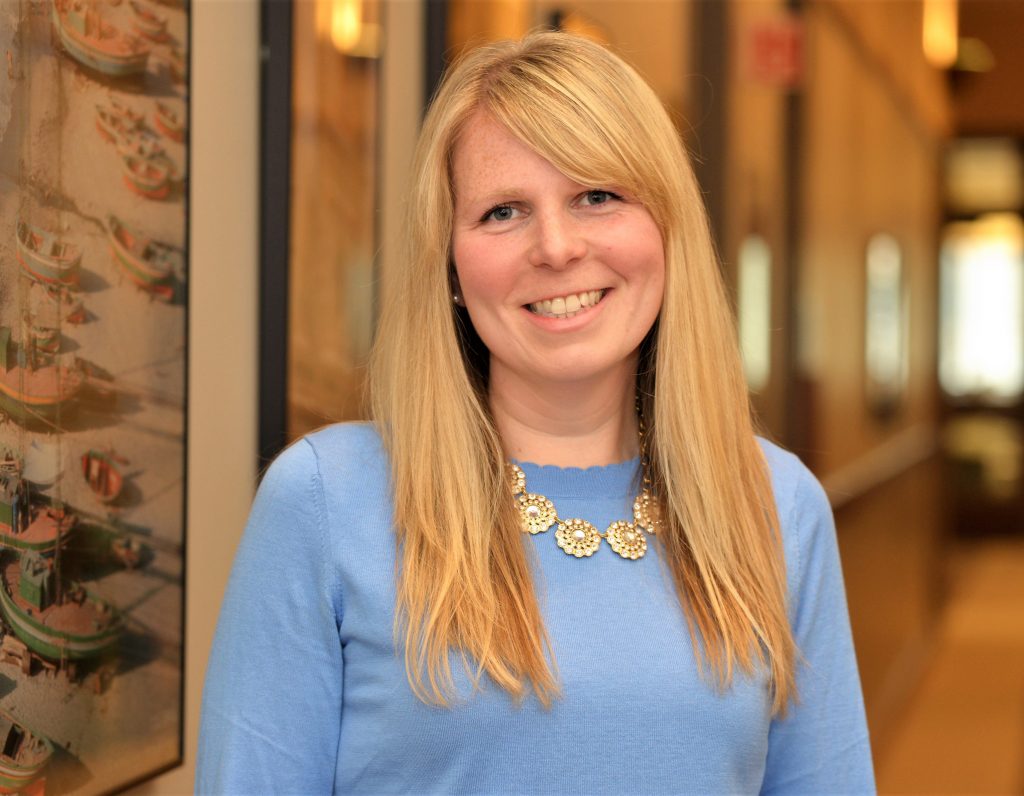
Erica Thewis is taking a nontraditional route to land her dream job. The one-time culinary creationist sifted through both tasty and unappetizing career choices before she realized that her true passion was helping people and organizations excel. Now, studying for her master’s degree in human resources (MSHR) at DePaul’s Kellstadt Graduate School of Business, Thewis hopes to find her metaphorical elusive black truffle—a job that combines her new career path with morsels of her multidisciplinary skills and talents.
Associate Professor of Management Jaclyn Jensen, the faculty director of DePaul’s MSHR program, understands the challenges that Thewis and others with multidisciplinary educations and experience face when looking for a job in their desired career.
“As much as we talk about the need to be diverse and open to different backgrounds and perspectives, sometimes recruiters can be too quick to judge a candidate,” says Jenson. “When you have two candidates side by side and one has come up with matching degrees, and one has come up through a different functional path, the person who has a more traditional background may get the edge.”
Jensen notes that there are ways to address employers’ hesitation to hire a candidate with a wide-ranging education and career background. She recommends building a network of contacts in the current desired field and connecting with mentors. The mentors are especially important because they can provide an insider’s knowledge of the industry and give advice on how to approach applying for jobs. Jensen also recommends building business knowledge through continuing education courses, certificate programs or getting an advanced degree. As for candidates like Thewis who are in the MSHR program, Jensen recommends seeking an internship so that they can receive on-the-job learning while studying in the classroom.
“Something that all applicants, whether traditional or multidiscipline, will need in order to be effective in their new role is business acumen,” says Jensen. “This is being able to have a clear understanding of how a business works. This includes a sense of how your organization makes money, its goals and strategy, and how your technical expertise plays a role.” Jensen notes that business acumen can be learned through experience, but it can also be supplemented through additional study. She also stresses that multidisciplinary-background candidates highlight their transferable skills and business acumen to help land a job in their new field.
Gathering Ingredients for Success
 Thewis, who has undergraduate degrees in art history and Italian and an associate’s degree in baking and pastry making, has impressive business acumen. While living in Memphis, Thewis opened Pistache French Pastry from her home, where she made fresh macaróns, chocolates and petits fours. She sold her baked goods at local farmer’s markets, on the online marketplace Etsy and through catering companies. After a few newspaper profiles about her venture and great word-of-mouth, Thewis hit it big in the Memphis food scene, which made her job both sustainable and fulfilling.
Thewis, who has undergraduate degrees in art history and Italian and an associate’s degree in baking and pastry making, has impressive business acumen. While living in Memphis, Thewis opened Pistache French Pastry from her home, where she made fresh macaróns, chocolates and petits fours. She sold her baked goods at local farmer’s markets, on the online marketplace Etsy and through catering companies. After a few newspaper profiles about her venture and great word-of-mouth, Thewis hit it big in the Memphis food scene, which made her job both sustainable and fulfilling.
“Pistache French Pastry truly was a learn-as-you-go experience,” says Thewis. “I discovered everything you needed to know about how to run a business. This was a smaller market, which gave me the opportunity to make mistakes and to learn from them. I also learned that I wanted to be a part of the business and not just on a pastry assembly line.”
Personal reasons brought Thewis back to Chicago where she decided to change professions. After searching for jobs online that infused her interests, Thewis became interested in the job postings for human resource roles.
“Baking is a solitary life, but I want to engage with people,” says Thewis.
I want to help people find their passion and get to a place where they feel valued at work. I also wanted to work in a business that has a strategy and goals that isn’t about the number of cakes that get iced.”
Mix in New Passions
Thewis applied to every HR job she found, but without any nibbles on her applications, she decided to look into an advanced business degree. While attending an info session at DePaul, she sparked a conversation with Anthony Cuellar, assistant director of recruiting for DePaul’s Kellstadt Graduate School of Business, who also has a multidisciplinary background with a bachelor’s degree in audio arts and acoustics and a master’s in counseling.
“Many students think that if they don’t have an undergraduate business degree, they are not qualified for graduate business school,” says Cuellar. “That is not the case.
Many times multidisciplinary backgrounds provide businesses transferable skills like conflict management, leadership and communication—skills the mean something in the real world.”
Cuellar also notes that DePaul has been seeing a sizable increase in business school applications from students with non-traditional backgrounds as well as career changers. In fact, DePaul’s full-time MBA student cohort entering in fall 2018 has applicants who are military veterans, healthcare practitioners, lawyers and other non-business careerists.
“Students coming from non-business backgrounds have an outside-looking-in perspective,” observes Cuellar. “The more a student is removed from their bachelor’s degree, the more professional experience and transferable skills they bring into the classroom. They are bringing different perspectives of leadership.”
Bake to Perfection
 Thewis is eager to take more human resources courses and to integrate all of the unique ingredients of her background into her new career, including her experiences of owning a business and studying art history.
Thewis is eager to take more human resources courses and to integrate all of the unique ingredients of her background into her new career, including her experiences of owning a business and studying art history.
“Art history is about analyzing and looking at everything critically,” says Thewis. “I bring those skills into the business world and try to look for the whole story, not just a solution to a problem. I am able to bring in real examples from owning Pistache into my business courses. I also like to consider the human aspect of a business and the way that people matter, which is why I am eager to get into the HR curriculum.”
Jensen agrees with Cuellar that multidisciplinary backgrounds bring new perspectives and transferable skills to the business world, but also recommends that non-business students take business courses.
“Businesses value the critical thinking skills and communication abilities and even the creativity of those who graduate with a liberal arts degree,” says Jensen. “A business degree offers those with a multidisciplinary background an opportunity to apply those skills in a business context while also showing an employer, through their new degree, that they have an appreciation for all the functional areas of business, like management, finance, economics and others. It also shows that the candidate appreciates that there is technical knowledge and skills associated with each of those different disciplines.”
Changing careers for those with a multidisciplinary background can be as tricky as nailing a perfect soufflé, but by mixing together the transferable skills from a diverse background with business acumen and education can prove to be a recipe for success.
By Andrew Zamorski
